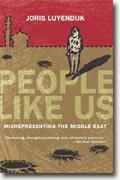People Like Us
Joris Luyendijk
book reviews:
· general fiction
· chick lit/romance
· sci-fi/fantasy
· graphic novels
· nonfiction
· audio books
· author interviews
· children's books @
curledupkids.com
· DVD reviews @
curledupdvd.com
newsletter
win books
buy online
links
home
for authors
& publishers
for reviewers

 |
People Like Us: Misrepresenting the Middle East Joris Luyendijk Soft Skull Press Paperback 256 pages September 2009 |
|
Author Joris Luyendijk wants you to know: “…this book is about factors that lie beyond the control of journalists, but that influence what those journalists cover, and how.”
Luyendijk began his career optimistically as a Middle East correspondent in 1998. His credentials included a degree in social sciences and fluency in Arabic. Journalistic experience was not required. His job was to check reports from news agencies such as the Associated Press and leads from tipsters, then ‘present’ it from his position as Middle Eastern Correspondent in, for instance, Baghdad. Most of what Luyendijk reported could as well have been written back in the offices of the newspaper he worked for but would have seemed less important without his physical location included. It isn’t just the illusion of intelligence based on location that slips past the truthometer – truth, itself, gets skewed in the process. Luyendijk tells of watching CNN as “jubilant Iraqis screamed into the camera lens and struck the [statue of Saddam Hussein] with their shoes. ‘Thank you, Mister Bush!’” Switching to Al-Jazeera, Luyendijk saw “the same square…you could see how few [people] there were actually standing in the square and that most of the people were watching from a safe distance.”Truth really is relative in the business of news, and the story that is told is not necessarily the important one but the one that has the best kicker. Sometimes the victims are perpetrators, sometimes the bullies are victims. Journalists who are in a position to know what is really happening are discouraged from telling the whole truth because it does not align with the focus of the news agency’s thrust. We may think of news reports as live, on-the-spot and in-the-moment accounts of a given event. In fact, every shot and every item is carefully laid out and rehearsed. Luyendijk recounts how “a friend asked me how I’d managed to answer all the questions during those cross-talks, every hour and without hesitation. When I told him that, like on the TV news, you knew all the questions in advance, his emailed response came packed with expletives. My friend had realized that, for decades, what he’d been watching and listening to on the news was pure theatre.”People Like Us Luyendijk’s most valuable contribution to reporting may be this book, in which he shares his bewilderment with readers. What is written here should be required reading for all of us who think we’re learning to understand the world by watching news programs and reading newspapers. Originally published on Curled Up With A Good Book at www.curledup.com. © Deborah Adams, 2010 |
|
|
|
 Click here to learn more about this month's sponsor! |
|
| fiction · sf/f · comic books · nonfiction · audio newsletter · free book contest · buy books online review index · links · · authors & publishers reviewers |
|
| site by ELBO Computing Resources, Inc. | |
